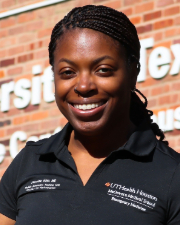Jasmine Ginn, MD

Jasmine Ginn, MD
Dr. Jasmine S. Ginn is an Assistant Professor and Simulation Specialist at the University of Texas Health Science Center at Houston. Prior to her start at UTHealth, she obtained her medical degree from Howard University College of Medicine and completed her training in emergency medicine at the University of Chicago. Following residency, Dr. Ginn stayed in Chicago to partake in a one-year EM simulation fellowship at Rush University where she created and conducted bi-weekly medical and communications skills-based modules for medical students, EM residents, and EM faculty in the department using a multi-disciplinary approach that included other medical specialties such as nursing and pharmacy.
Additionally, during her fellowship training year she attended several national conferences including SAEM, in which she assisted with content creation and facilitation for SimWars for the competing residency teams and RMWC where she assisted with daily procedural skills-based sim sessions and the production and facilitation of a mass casualty sim experience. She also attended both the JUMP course at one of the largest simulation centers in the world and the Healthcare Simulation Essentials course at the Center for Medical Simulation to enhance her sim module development, facilitation, and debriefing skills. During her training she also presented sim-based research locally at Rush Research Day and the annual ICEP conference, and nationally at SAEM.
Since her arrival at UTHealth, Dr. Ginn has continued down the simulation track with both McGovern EM residents and medical students on a monthly basis. She has participated in several community simulation events that involved teaching residents of Houston and surrounding suburbs how to perform hands-only CPR and teaching EMTs skills such as pre-hospital management of cardiac arrest, stroke, precipitous delivery, and pediatric respiratory distress in rural Texas.
Dr. Ginn currently oversees the UTHealth Saves A Life series, which incorporates sim to teach basic life-saving pre-hospital care techniques to students such as AED use, anaphylaxis care and epi-pen administration, and management of infant and adult choking. She looks forward to continuing to use simulation as a teaching tool in the advancement of medical education for both medical professionals and general community members.